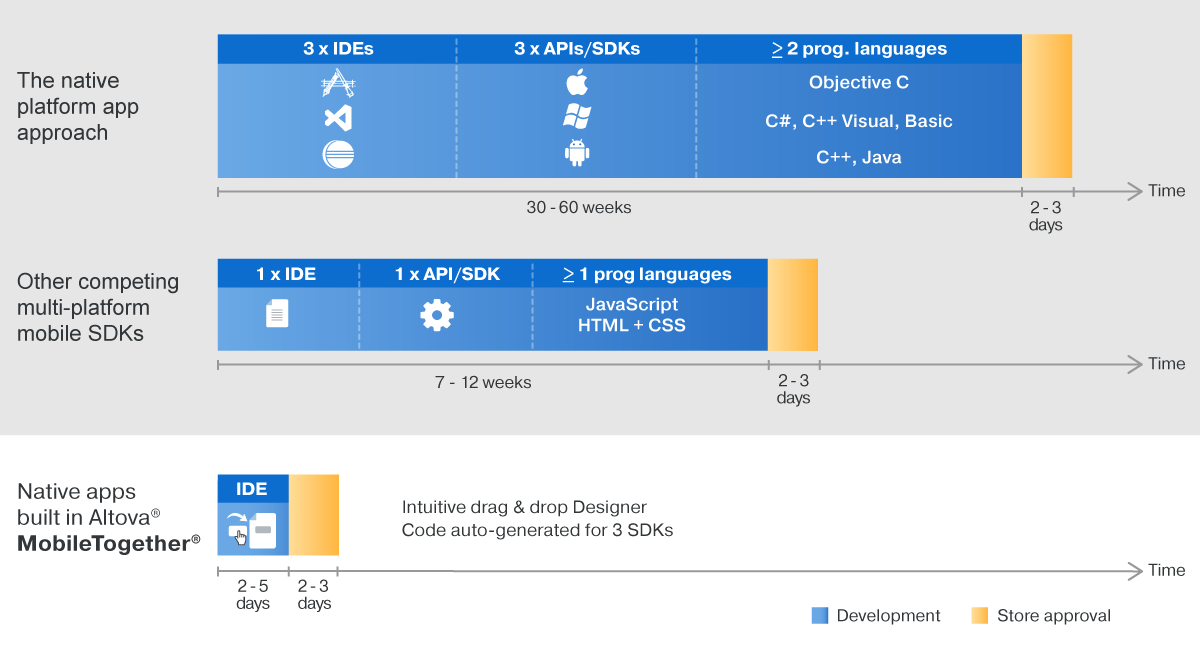2024-02-08T17:21:28
Status: #moc
Tags: #mobile #apps
Links: [[home]] | [[Technology]] | [[Software Development]] | [[Enterprise Solutions]] | [[Tools for Solution Providers]]
# Mobile App Development
[Mobile app development](https://www.altova.com/mobiletogether/app-development) is an ever-evolving field, driven by the growing demand for mobile applications that offer seamless user experiences across a variety of devices. Businesses and developers continuously seek efficient, cost-effective ways to create apps that meet the dynamic needs of users across the globe. This article provides an overview of native app development on both iOS and Android platforms, then delves into cross-platform mobile app development solutions, including the burgeoning area of low-code and no-code mobile app development platforms.
![[afalk42_An_illustration_for_a_knowledge_base_article_on_Mobile__f83f0f69-b2a4-4577-b667-4c8fe9be294e.png]]
### Native App Development
Native app development involves building applications specifically for a particular operating system, leveraging the platform's native programming languages and development tools. These applications can directly access the hardware and software features of the devices, enabling optimal performance and user experience.
#### iOS
iOS development is primarily done using [[Swift]] or [[Objective-C]]. Developers use Xcode, [[Apple]]'s integrated development environment (IDE), to build, test, and deploy iOS applications. The ecosystem provided by Apple ensures that apps deliver high performance and a rich user experience, taking full advantage of iOS-specific features.
#### Android
[[Android]] app development typically uses [[Java]] or [[Kotlin]]. Android Studio is the official IDE for Android, offering comprehensive tools and features for developing, testing, and deploying applications to the Google Play Store. The open-source nature of Android offers a flexible development environment, though the fragmentation of devices can be a challenge.
### Cross-Platform Mobile App Development
[Cross-platform mobile app development](https://www.altova.com/mobiletogether/app-development#code-gen) addresses the complexity and cost of developing apps separately for each platform. It allows developers to write the code once and deploy it across multiple platforms, including iOS and Android. This approach significantly reduces development time and effort, leading to faster deployment and lower costs.
#### Popular Cross-Platform Solutions
1. **[React Native](https://reactnative.dev/)**: Developed by [[Facebook]], React Native allows developers to build mobile apps using JavaScript and React. Its "learn once, write anywhere" philosophy enables sharing of code across platforms while still offering a native-like performance and user experience.
2. **[Flutter](https://flutter.dev/)**: [[Google]]'s UI toolkit for crafting natively compiled applications for mobile, web, and desktop from a single codebase. It uses the Dart programming language and provides a rich set of fully-customizable widgets to create high-quality interfaces.
3. **[Xamarin](https://dotnet.microsoft.com/en-us/apps/xamarin)**: Owned by [[Microsoft]], Xamarin uses C# for developing apps that run natively on iOS, Android, and Windows. It offers robust tools for testing and tracking app performance, making it a favorite among enterprises.
4. **[[ActionTrees Visual Programming Language]]**: Developed by [[Altova]], the [[MobileTogether]] cross-platform application development platform uses a combination of visual drag-and-drop programming language and [[XQuery]] expression language for data manipulation.
### Low-code and No-code [Rapid Mobile App Development](https://www.altova.com/mobiletogether/app-development) Platforms
The rise of low-code and no-code platforms has democratized mobile app development, making it accessible to non-technical users and reducing the dependency on experienced developers for building applications.
- **Low-code platforms** offer a visual development environment, where users can [drag and drop components to design their app](https://www.altova.com/mobiletogether/app-development#designer), [write minimal code for customization and functionality](https://www.altova.com/mobiletogether/app-development#action-trees), and quickly deploy applications. Examples include [[MobileTogether]], Mendix, OutSystems, and Appian.
- **No-code platforms** take this a step further by eliminating the need for any coding whatsoever, enabling almost anyone to build apps using pre-built templates and intuitive interfaces. [[RecordsManager]], Bubble, Adalo, and Glide are notable examples in this space.
### Conclusion
The [mobile app development](https://www.altova.com/mobiletogether/app-development) landscape offers a spectrum of options, from native development with its high-performance apps tailored to specific platforms, to cross-platform solutions that provide efficiency and speed in delivering apps across iOS and Android. With the addition of low-code and no-code platforms, the barrier to mobile app development continues to lower, making it more accessible than ever to bring innovative ideas to life and reach users across the globe, and some of these tools, such as [[MobileTogether]], even allow you to produce native apps at an accelerated pace for all platforms at once:

Whether you are a seasoned developer or a business professional with no coding experience, the current ecosystem provides the tools and technologies necessary to create impactful mobile applications.
## Related Blog Posts
- [[Using XML Schema in AI System Prompts]]
---
# References
* [[MobileTogether]]
* [[ActionTrees Visual Programming Language]]
* [[Modular App Development]]
* [[App Simulator]]
* [[App Tester]]
* [[App Debugger]]
* [[Modular App Development]]
- https://www.altova.com/mobiletogether/app-development